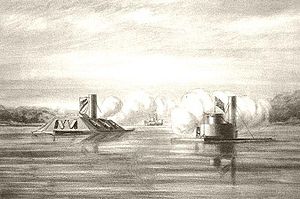Battle of Wassaw Sound facts for kids
Quick facts for kids Battle of Wassaw Sound |
|||||||
|---|---|---|---|---|---|---|---|
| Part of the American Civil War | |||||||
 |
|||||||
|
|||||||
| Belligerents | |||||||
| Commanders and leaders | |||||||
| John Rodgers | William A. Webb | ||||||
| Strength | |||||||
| 2 ironclads 1 gunboat |
1 ironclad ram 2 wooden steamers |
||||||
| Casualties and losses | |||||||
| none | 1 killed 16 wounded 1 ironclad captured |
||||||
The Battle of Wassaw Sound was an important naval battle during the American Civil War. It happened on June 17, 1863, in Wassaw Sound, Georgia. This battle was also known as the Capture of CSS Atlanta.
The fight was between the Confederate ship CSS Atlanta and Union ships. The Union forces included two powerful ironclad ships called monitors, USS Weehawken and USS Nahant. They also had a gunboat named USS Cimmerone.
During the battle, the Confederate ship Atlanta got stuck in the mud. This made it an easy target. After a short fight, the Atlanta had to give up to the Union ships. Captain John Rodgers, who led the Union forces, became a national hero. He was promoted and honored for his big win.
Contents
Why the Battle Happened
Union Blockade and Confederate Plans
The Union Navy had set up a "blockade" along the Confederate coast. This meant they tried to stop ships from entering or leaving Confederate ports. The goal was to prevent supplies from reaching the South.
The Confederate ship CSS Atlanta was a special type of ironclad called a ram. It was designed to break through this blockade. The Confederates hoped Atlanta could attack the Union ships.
Union Prepares for Attack
On June 10, 1863, Union Rear Admiral Du Pont heard news. He learned that the CSS Atlanta was planning to move down the Wilmington River. Its goal was to enter Wassaw Sound and attack the Union ships there.
To stop this, Admiral Du Pont sent his own ships into Wassaw Sound. These included the monitors USS Weehawken and USS Nahant. He also sent the gunboat USS Cimmerone. Captain John Rodgers was in charge of these Union ships.
Atlanta Gets Ready
On the evening of June 15, the Atlanta started its journey. It moved past obstacles in the Wilmington River. This put it in a good position to attack the Union ships.
The ship stopped to load coal for the rest of the night. The next evening, the Atlanta moved closer to the Union monitors. It stayed hidden, ready to attack early the next morning.
The Battle Begins
Atlanta's Attack Plan
Before sunrise on June 17, the Atlanta began its move. It was joined by two wooden steamers, CSS Isondiga and CSS Resolute. The Atlanta had a special weapon. It was a "percussion torpedo" attached to a long pole at its front. The Confederate captain, William A. Webb, planned to hit the Weehawken with this torpedo.
A Costly Mistake
During its movements, the Atlanta suddenly ran aground. This means it got stuck in the shallow mud. The ship was tilted, making it very hard for its cannons to aim and fire properly.
The Union ship Weehawken waited. It held its fire until it was very close, about 300 yards away. Then, it began to heavily shell the stuck Confederate ship. The Nahant also helped by drawing some of the Atlanta's fire. This allowed the Weehawken to get even closer.
Quick Surrender
The battle was very short, lasting only a few minutes. The Weehawken hit the Atlanta five times with its heavy 350-pound cannonballs. These powerful shots caused a lot of damage.
One shot made a hole in the Atlanta's armored side, called a casemate. Another shot crushed the ship's pilot house, where the helmsmen steered the ship. Several pilots and helmsmen were badly hurt. Because of the damage and injuries, Captain Webb had no choice but to surrender right away.
The Atlanta became the first Confederate ironclad ship to be captured by the Union. The two wooden steamers that were with Atlanta quickly sailed away to safety.
After the Battle
Casualties and Capture
The Atlanta had one person killed and 16 wounded during the battle. When it was captured, 21 officers and 124 men, including marines, were taken prisoner.
The Union later decided to keep the Atlanta. It was repaired and became a Union ship, renamed USS Atlanta, on February 2, 1864.
A Hero's Welcome
Captain Rodgers became a national hero for his victory. He received the Thanks of Congress, which is a special honor from the United States Congress. He was also promoted to the rank of commodore.
The Nahant was also part of the battle. Its crew later received a share of the prize money from capturing the Atlanta.
 | William M. Jackson |
 | Juan E. Gilbert |
 | Neil deGrasse Tyson |

